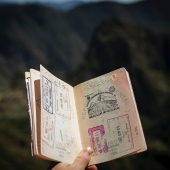On February 16th, the Chinese New Year celebrations will begin and herald the new year of the Dog. If you are planning a study trip to China, or any other country that celebrates Chinese New Year, or even if you want to celebrate it at home with friends or family, make sure to read our guide for some advice!
Also known as the Spring Festival, Chinese New Year is the most important holiday in the traditional Chinese calendar, which is lunisolar, meaning it defines years, months and days by the movements of the moon and the sun. This means that the Chinese New Year begins on the new moon between 21st January and 20th February. The celebrations end with the Lantern Festival on the 15th of the first calendar month.
For Chinese families, it is a sacred period in which friends and relatives travel from across the globe to return to their family homes to eat traditional Chinese food, set off fireworks and exchange hongbao, red envelopes with good luck money inside. It has been described as the ‘largest annual mass human migration in the world’.
Of course, there is more to it than simply that. The hundreds of years of history, custom and myth have led to a developed and complex social event.
Mythology
Historically, the festival was a time to celebrate ancestors and deities.
According to legend, Chinese New Year began when a mythical creature called the Nian, a beast that lives under the sea or in the mountains, and resembles a cross between a lion and a dragon, would attack the village and eat people, mostly children, at the beginning of each year.
The villagers would hide, the story goes, and hope that the Nian would not find them. One year, an old man appeared in the village and said that he had had enough of the Nian, so he set off into the night and covered the village with red paper and firecrackers.
The rest of the villagers thought him insane, but when they returned to their village in the morning, they found that nothing had been destroyed. They assumed the old man was a deity who had come to save them, but then understood the Nian was afraid of loud noise and the colour red.
So now every year, the villagers would wear the colour red, hang red lanterns and set off firecrackers to frighten away the Nian, traditions which continue today.
Customs
Although this is the myth which supposedly most of the Chinese New Year customs have developed, the celebration has more to do with the good luck of the coming year and the cleaning away of the previous year’s bad luck than any mythical beast.
In fact, the Nian myth supposedly isn’t too old and is perhaps more likely a tale for children so as to make them behave better! Nevertheless, Chinese New Year remains an intricate and developed celebration with lots to remember in order to bring yourself good luck for the rest of the year.
Of course one of the major traditions is the relationship between each year and its zodiac symbol. This coming year will be that of the Dog. If you were born during a previous year of the Dog, make sure to pay good attention as by following the traditions correctly, you will be granted extra luck! However, some will also say that celebrating Chinese New Year in your zodiac year is bad luck, so be careful! (See, we did mention it can get complex).
Cleaning
Similar to the Western tradition of Spring cleaning, in which the house was dusted and cleaned from top to bottom in early Spring (it being warm enough to open windows then, but not so hot to allow insects in), Chinese New Year is preceded by an extensive cleaning process.
Houses are cleaned from top to bottom and in households where Buddhism or Taoism is prevalent, home altars and statues are cleaned, while decorations from over the past year are taken down and burned, to be replaced with new ones.
It is believed that the cleaning sweeps away the bad luck of the preceding year and empties the house for the incoming good luck. Brooms and dust pans are also put away on the first day so that the new good luck cannot be swept away. This cleaning also serves the dual purpose of preparing the house for the traditional decorations.
Decorations
Red. Lots and lots of red. With some gold. But mostly red.
Red brings lots of good luck, so people will cover their houses in red, whether that be new wallpaper, sheets, blankets, wall coverings, lamps or lanterns. Some even go so far as to repaint walls, doors and window-frames red.
Additionally, homes will be decorated with paper cut-outs of auspicious phrases and couplets.
Clothing
The colour red even extends to people’s underwear- wearing red is also considered to bring good luck. Especially if the New Year’s zodiac sign corresponds with your birth year.
Some will purchase new shoes and clothes to symbolize a new start. Additionally, haircuts have to be had before the New Year, as cutting any hair off during the New Year celebrations is considered bad luck. This is because the words ‘hair’ and ‘prosperity’ sound almost identical when spoken in Chinese.
Family
As with any great celebration, Chinese New Year is a time to be with your family and friends, eat a big meal, exchange gifts and enjoy your time with one another. The big event will be held on New Year’s Eve and it is called the reunion dinner.
It can be a bit of a stressful experience for young adults though! Older relatives will often interrogate the more youthful about work and relationships. In fact, it’s not unheard of for some young people to ‘hire’ a girlfriend or boyfriend just for the festival, so they will get left alone!
Families will also often visit their local temple during Chinese New Year for good luck and fortune.
Food
Dishes consisting of all manner of special and unique meats are served, both as a main course and an offering. Some of these food have symbolic meanings; fish for example is commonly eaten as the word for ‘fish’ sounds very similar to ‘surplus’ and so eating fish is thought to bring a surplus of money and good luck. Noodles are also commonly eaten as they represent a long life.
In northern China, it is customary to make jiaozi dumplings after dinner to eat at midnight. They symbolize wealth as they are similar in shape to an old form of currency called sycee. Often, one of the dumplings will be made especially sweet, or salty, or will have a coin inside. The person who eats this special dumpling is thought to have extra special good luck that year.
In the south, niangao, a glutinous cake, is often made and it is customary to give pieces of it as gifts to relatives and friends over the coming days.
Other typical foods eaten include spring rolls, fruit, sweet rice balls and Chinese rice pudding!
Fireworks & Parades
As part of the Nian mythology, it is commonplace for fireworks and firecrackers to be set off, but beware: this can make for quite the loud celebration! They are mostly set off at midnight, but can go on throughout the night to scare off bad spirits.
It is also believed that the person who lights the first firework will obtain good luck for the rest of the year.
Of course, there are also lots of parades where people in traditional costumes dance and practice martial arts, while some dressed as lions will also dance through the streets. The wearing of lion and dragon costumes while dancing along the street is a popular image people have of the festival and for good reason! The costumes are emblematic of the excitement, fun, history and tradition of this great event.
Gifts
If you find yourself given a red envelope, you’re in luck! A common gift during the Lunar Festival, a red envelope, or hongbao, typically contains money and is usually given to the very young or the very old. It is a gesture of good luck, but also is intended to maintain age and health. It is considered disrespectful to give tattered notes so the money inside should be crisp and new.
Two hands are always used when giving or receiving a gift as it shows respect and appreciation.
You should also be aware that it is seen as rude to open a gift immediately after you receive it. You should first show thanks, then open it in private.
Anything Else?
To make sure you maintain your fortune and good luck (and to avoid embarrassing yourself) make sure you don’t:
- wear anything old
- wash your hair, clothes or clean – you’ll wash away your good luck!
- eat porridge as this is connected to poverty
- give pears or fresh flowers as a gift (they represent death and separation)
- avoid anything related to the number four- it sounds similar to the word for death (also avoid giving gifts in multiples of four)
- use knives or scissors as they will ‘cut your wealth’
- lend or borrow money, as this could lead to debt
- visit the hospital as this could bring in bad health
- give a watch or clock as a gift, they symbolise running out of time
- wear black or white as they are bad luck colours
- cry or break any dishes!
So there are a few things there to remember for your Chinese New Year celebration, but of course we have barely scratched the surface! Traditions and customs for this celebration could fill a book, so if in doubt just make sure you do what you can to make someone else happy and enjoy the experience!
Just make sure you wish everyone a ‘chun jie kuai le’ (春节快乐) and keep the good luck and fortune going for another year!










